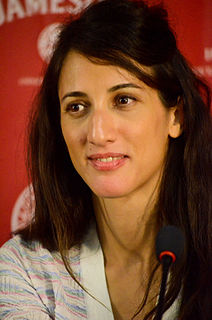A Quote by Deniz Gamze Erguven
Men, not only in Turkish society but everywhere, have been the bosses in terms of creation. If you look at art history, women were the objects. The fact that it's not been made by women means that the subjects are not women.
Related Quotes
Many women, particularly young women, have claimed the right to use the most explicit sex terms, including extremely vulgar ones, in public as well as private. But it is men, far more than women, who have been liberated by this change. For now that women use these terms, men no longer need to watch their own language in the presence of women. But is this a gain for women?
Women's tennis has been around for a very long time - we're talking about the 1800s. But women's soccer hasn't had such a long history, so now they're right at the beginning of really trying to make things equal. We need to continue not only to advocate for women but to have men advocating for women.
If you just look at the number of roles for women versus the number of roles for men in any given film, there are always far more roles for men. That's always been true. When I went to college, I went to Julliard. At that time - and I don't know if this is still true - they always selected fewer women than men for the program, because there were so few roles for women in plays. That was sort of acknowledgment for me of the fact that writers write more roles for men than they do for women.
A materialist feminist approach to women's oppression destroys the idea that women are a 'natural group' . . . What the analysis accomplishes on the level of ideas, practice makes actual at the level of facts: by its very existence, lesbian society destroys the artificial (social) fact constituting women as a 'natural group.' A lesbian society pragmatically reveals that the division from men of which women have been the object is a political one . . .
Marjan. I have told him tales of good women and bad women, strong women and weak women, shy women and bold women, clever women and stupid women, honest women and women who betray. I'm hoping that, by living inside their skins while he hears their stories, he'll understand over time that women are not all this way or that way. I'm hoping he'll look at women as he does at men-that you must judge each of us on her own merits, and not condemn us or exalt us only because we belong to a particular sex.
It was this feminine conspiracy which made Southern society so pleasant. Women knew that a land where men were contented, uncontradicted ans safe in possession of unpunctured vanity was likely to be a very pleasant place for women to live. So, from the cradle to the grave, women strove to make men pleased with themselves, and the satisfied men repaid lavishly with gallantry and adoration. In fact, men willingly gave ladies everything in the world except credit for having intelligence.
Men have been domesticated, and I don't think it's necessarily good for them. They have been emasculated with the pill and women becoming more independent. I do think it's made a big difference for women to have more charge of their own bodies. It's made them feel more on equal terms and made the men feel less secure, less the master of everything.
There's only a very small representation of girls among you. Too little. Women have much to tell us in today’s society. Sometimes we are too machistas and we don't allow enough space to women. But women can see things from a different angle to us, with a different eye. Women are able to pose questions we men are unable to understand. Look out for this fact: she is the only one who has put a question for which there is no answer. She couldn't put it into words but expressed it with tears.
Women get the short shrift in history. It's been largely written and dictated by men, or at least men believe that we own it, and women have really been in those quieter moments at the edge of history. But, really, they're the ones who are turning the cogs and the wheels and allowing things like the peace process to happen.

































